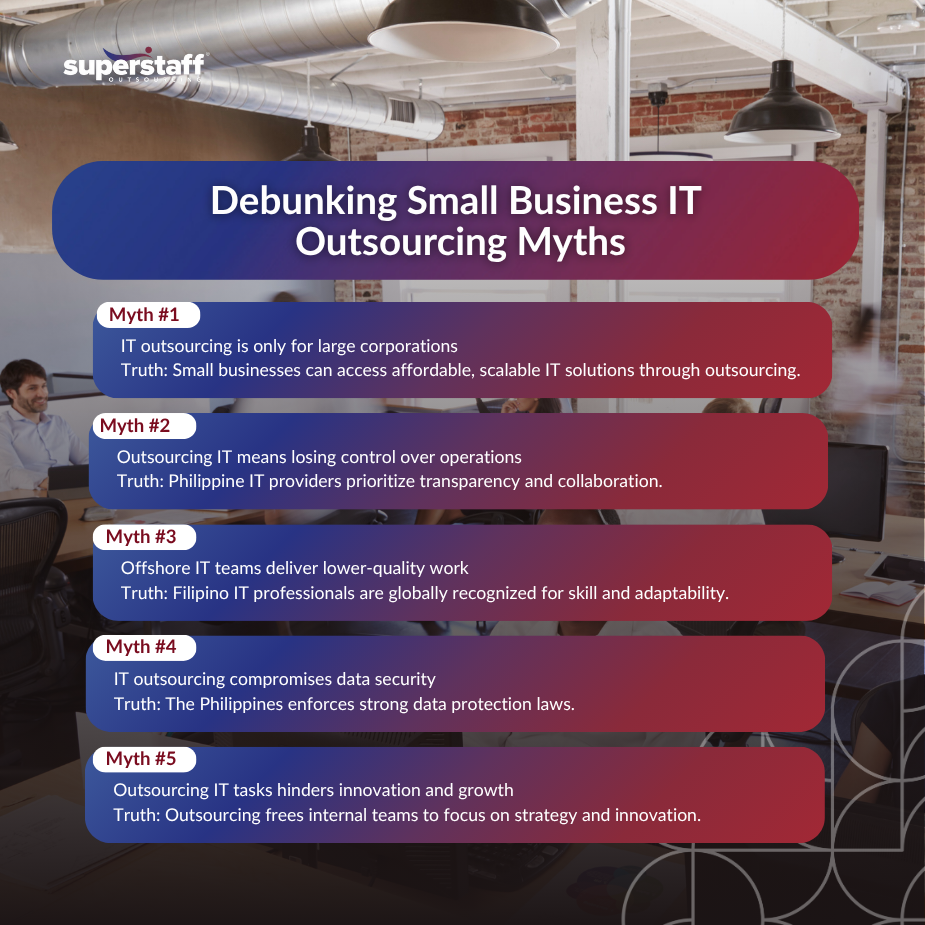
Many startup executives hesitate when they hear the phrase small business IT outsourcing. They picture losing control, dealing with language barriers, or getting subpar service from halfway across the world. This skepticism has persisted for years, fueled by myths that paint outsourcing as a risky or impersonal move reserved only for big corporations. But in reality, these misconceptions often stop SMEs from accessing the same high-quality IT expertise that larger companies rely on every day.
The truth is, IT outsourcing, especially to the Philippines, isn’t just about cutting costs. It’s about gaining a reliable, human-centered partnership that supports growth, scalability, and innovation. Filipino IT professionals combine technical proficiency with genuine collaboration and care, offering a global support model built on trust, cultural compatibility, and consistent performance.
In this blog, we’ll debunk the common myths about outsourcing IT for small businesses Philippines and uncover the real value behind partnering with a human-centered, globally competitive IT outsourcing provider.
Myth #1 – IT outsourcing is only for large corporations
One of the most persistent misconceptions about IT outsourcing is that it’s a luxury reserved for large enterprises with massive budgets. This belief couldn’t be further from the truth. In today’s digital economy, small business IT outsourcing has become not only accessible but also a strategic necessity for SMEs seeking to stay competitive.
Outsourcing enables small businesses to access specialized IT expertise without the financial strain of maintaining an in-house department. Hiring full-time developers, network engineers, or cybersecurity professionals can be costly—especially when you factor in recruitment, benefits, and training. By partnering with an outsourcing provider, SMEs can access the same high-level technical capabilities that Fortune 500 companies enjoy, but at a fraction of the cost.
Modern outsourcing models are built for flexibility. Philippine providers, in particular, offer scalable engagement models that allow startups and small enterprises to adjust services based on their growth phase. For example, a startup might begin by outsourcing basic helpdesk functions and later expand to include cloud migration, data analytics, or software development. This adaptability ensures that businesses pay only for what they need—when they need it.
Outsourcing also helps small businesses stay lean and agile. Instead of allocating large budgets to IT infrastructure or permanent hires, they can redirect funds toward innovation, marketing, or customer engagement. In essence, outsourcing transforms IT from a fixed overhead cost into a dynamic growth enabler.
Scalability isn’t the only misconception—many small business owners also worry about losing control.

Myth #2 – Outsourcing IT means losing control over operations
For many small business owners, the idea of outsourcing IT functions sparks one immediate concern: “Will I lose control of my operations?” This fear is understandable but outdated. The reality is that IT outsourcing for small businesses today is built on transparency, collaboration, and shared accountability—especially when partnering with experienced providers in the Philippines.
Philippine outsourcing companies have embraced technology that keeps clients in the loop every step of the way. Through project management tools like Jira, Asana, or Trello, clients can track progress in real time, view task updates, and even communicate directly with their remote teams. This high level of visibility ensures that business owners maintain control over timelines, priorities, and outcomes.
Regular communication is another key aspect. Filipino IT teams are known for their strong English proficiency and proactive approach to collaboration. Weekly or even daily updates, performance reports, and KPI tracking are common practices. This creates a partnership dynamic where offshore teams serve as an extension—not a replacement—of internal staff.
Many businesses also find that outsourcing helps increase control rather than reduce it. With standardized processes, Service Level Agreements (SLAs), and clearly defined escalation procedures, small businesses gain greater predictability and consistency in their IT operations. Instead of managing individual employees, they manage outcomes—freeing leadership to focus on strategy.
A good example can be found in small U.S.-based SaaS companies that partner with Philippine IT providers for network monitoring or customer support. These partnerships thrive because the teams operate in sync, guided by mutual goals and open communication.
Beyond control, another common hesitation comes from concerns about quality and expertise.
Myth #3 – Offshore IT teams deliver lower-quality work
Another common myth about outsourcing IT for small businesses in the Philippines is that offshore teams deliver subpar quality compared to local hires. This misconception couldn’t be further from reality. Filipino IT professionals have earned global recognition for their technical proficiency, adaptability, and professionalism.
The Philippines has a strong educational foundation in science, technology, engineering, and mathematics (STEM). Universities across the country produce thousands of IT and computer science graduates each year, many of whom hold globally recognized certifications such as CompTIA, Cisco (CCNA/CCNP), AWS, and Microsoft. This solid academic foundation is supported by a thriving digital ecosystem where local IT professionals continuously upskill through tech bootcamps, hackathons, and international collaborations.
Moreover, Philippine IT outsourcing providers strictly adhere to global quality and security standards. Many operate under ISO 9001 (Quality Management), ISO 27001 (Information Security), and ITIL (Information Technology Infrastructure Library) frameworks. This ensures that every project, from helpdesk support to cloud integration, follows structured, standardized processes.
The country’s small business IT outsourcing sector has also developed a strong culture of performance and accountability. Filipino professionals are known for their adaptability and client-centric approach—values deeply rooted in their cultural emphasis on empathy and service. As a result, client satisfaction levels remain consistently high.
When small businesses experience this level of professionalism and commitment, the idea that offshore equals “low quality” quickly fades. In fact, many discover that their outsourced teams often outperform in-house hires in both productivity and innovation.
Once quality concerns are addressed, the next myth often revolves around security.
Myth #4 – IT outsourcing compromises data security
Data security remains one of the most discussed topics in the outsourcing industry—and understandably so. Business leaders often fear that sharing sensitive information with external teams might lead to breaches or misuse. However, this fear largely stems from outdated perceptions. The reality is that the Philippines has developed a robust regulatory framework that prioritizes data protection and aligns with international standards.
The Philippine Data Privacy Act of 2012 (Republic Act No. 10173) mirrors the European Union’s General Data Protection Regulation (GDPR). This means outsourcing providers in the Philippines are legally bound to maintain strict data handling, storage, and processing standards. Non-compliance can result in heavy penalties and loss of accreditation—ensuring that companies take data privacy very seriously.
Leading small business IT outsourcing providers go beyond compliance by implementing multi-layered cybersecurity protocols. These include encryption technologies, firewalls, access control systems, and regular security audits. Additionally, many Philippine BPOs maintain dedicated cybersecurity teams tasked with monitoring threats and conducting vulnerability assessments around the clock.
Partnership contracts typically include Non-Disclosure Agreements (NDAs) and Service Level Agreements (SLAs) that outline data protection responsibilities. Cloud-based infrastructures are also configured with redundant backups and secure login mechanisms to safeguard business continuity.
This level of security ensures that IT outsourcing for small businesses is not only safe but also more robust than what many small companies can achieve independently. For an SME without a full-time IT department, partnering with a Philippine provider can actually improve cybersecurity posture by leveraging enterprise-grade infrastructure and expertise.
Security isn’t the only factor—another misunderstanding lies in the assumption that IT outsourcing stifles innovation.
Myth #5 – Outsourcing IT tasks hinders innovation and growth
Some small business owners believe that outsourcing IT functions might limit creativity or slow innovation. The reality is quite the opposite. When done strategically, outsourcing allows business leaders to refocus their time, budget, and energy on innovation while trusted experts handle technical execution.
One of the biggest advantages of small business IT outsourcing is resource reallocation. Instead of dedicating valuable in-house manpower to troubleshooting, maintenance, or repetitive IT tasks, businesses can invest more in product development, marketing, and customer engagement. This fosters a culture of innovation by ensuring that internal teams focus on the company’s strategic goals.
Filipino IT professionals are not just task executors—they are active contributors to digital transformation. Many outsourcing providers in the Philippines now offer consulting-driven services, including process automation, business intelligence, and cloud optimization. These services enable SMEs to access next-generation technologies without the high upfront costs of implementation.
Moreover, outsourcing encourages small businesses to adopt a global mindset. By working with diverse teams across time zones, companies learn new approaches to problem-solving and innovation management. The Philippine workforce’s strong English proficiency and cross-cultural adaptability make collaboration seamless, ensuring that creativity flows naturally across borders.
When innovation is fueled by efficiency and expertise, growth becomes inevitable. Small businesses that embrace outsourcing often find themselves scaling faster, responding better to market changes, and delivering improved customer experiences.
When these myths are debunked, the real benefits of outsourcing to the Philippines become clear.
The Philippine Reality – A Partner for Growth, Not Just Cost Savings
The real story behind common myths about outsourcing IT for small businesses Philippines is one of partnership, not transaction. The Philippines has long established itself as a trusted global outsourcing destination, offering more than just cost savings. It delivers cultural compatibility, technical excellence, and a people-first approach that resonates deeply with small business values.
The Philippine IT industry is anchored in empathy and collaboration—a reflection of the country’s service-oriented culture. Filipino IT professionals don’t just complete tasks; they take ownership of outcomes. This sense of accountability makes them ideal partners for small businesses that value reliability and teamwork.
Language and communication are also major advantages. With English as one of the country’s official languages and a neutral accent easily understood by Western clients, Filipino IT teams eliminate communication barriers that often challenge other outsourcing destinations. Combined with cultural alignment and a strong understanding of Western business norms, this creates smoother collaboration and faster project turnaround times.
Beyond people skills, the Philippines boasts a proven track record in diverse IT disciplines. From 24/7 helpdesk support to advanced cloud management, cybersecurity, and AI implementation, the country’s outsourcing sector has evolved to meet global demands. According to the IT and Business Process Association of the Philippines (IBPAP), the industry is projected to grow steadily, reflecting its global competitiveness and adaptability.
This combination of cost-effectiveness, competence, and commitment positions the Philippines as a genuine growth partner—not merely a cost-cutting solution. For small businesses looking to expand, innovate, and strengthen their IT foundation, the Philippine outsourcing ecosystem offers a strategic and sustainable path forward.
Now, it’s time to highlight how small businesses can take the first step.
Partner With SuperStaff for Reliable Small Business IT Outsourcing
IT outsourcing for small businesses is no longer a risky gamble; it’s a smart, strategic move for growth and efficiency. The idea that outsourcing is only for big corporations, that it causes loss of control, or that it jeopardizes security are outdated notions. The reality is that Philippine outsourcing providers have transformed how global small businesses operate, delivering high-quality service, data protection, and innovation support at competitive rates.
Small businesses can now compete on a global scale by partnering with trusted IT professionals in the Philippines. These teams combine technical expertise with cultural compatibility, offering not just cost savings but collaboration, innovation, and peace of mind.
In short, small business IT outsourcing isn’t about replacing your team—it’s about expanding your capabilities. By embracing the truth behind these myths, small business leaders can unlock new opportunities for growth and resilience in a fast-changing digital world.
If your business is ready to break free from IT limitations, consider partnering with SuperStaff, a Philippine outsourcing provider that understands your needs and vision.
Get in touch to discover how the right IT outsourcing strategy can transform your small business into a more agile, innovative, and future-ready organization.






